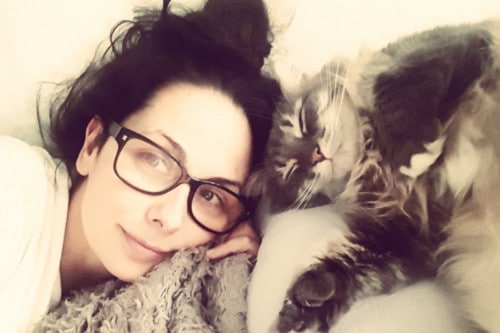It was only when she hit puberty that GiGi noticed there was something different about her breasts. They didn’t look like the other girls’ in the change room after gym class. They were small, oddly-shaped – almost like little tubes.
She tried to hide them in padded bras. As her teenage years dragged on, she became increasingly self-conscious: “I felt like a creature,” she says.
Her breasts were at the forefront of her insecurities, which in turn affected her dating life. “I didn’t want any guy to really see me – so I’d always keep the bra on, or a shirt on. It was always there in my mind. But I never talked about it to anybody.”
Then when she was 19, a family member got breast implants after having kids. For the first time, GiGi considered the option. She made an appointment with a plastic surgeon. He explained that she had a deformity called tuberous breasts, and that he could fix them.
“If you look at a picture of tuberous breasts, it’s all tight, like a long sock,” she explains. “He said he would release the constricted muscles and put in an implant to keep the area stretched out and give me some fullness.”
She was ecstatic. Finally, someone could do something. She hated the way her breasts looked – she found them hideous. “I didn’t even show my mom my breasts until I wanted to get the surgery to fix them. It was something I dealt with on my own.” Now, it seemed like there was a way to feel better about herself again.

“My parents really supported me. I remember when I went into the surgeon’s office, they make you watch a video, they talk about complications. I recall it was an overview of the procedure and cosmetic/surgical complications that could arise during and after surgery like hematoma, rupture, leaks, capsular contracture, infection and bottoming out.” But at that point in her life, she believed implants would fix her ‘problems,’ that they were safe and that she would be fine.
As she came out of the anaesthesia, however, she felt as if she’d been hit by a wave. “I literally woke up from the surgery and felt this despair. I never had that before.” A few days later, she was rushed to the hospital and diagnosed with a dangerous hematoma. “My whole breast was purple and massive. I had to get another surgery a few days later.”
When implants are placed in the body, it will often fight the ‘intruder’ – occasionally forming a capsule of tightly woven collagen fibres. “The capsule is like your body’s way of protecting itself from a foreign object,” explains GiGi. “So it forms this capsule around the implant to protect your body.” Capsular contracture is a condition that occurs when the collagen-fiber capsule shrinks, tightens and compresses the breast implant, much like the collapse of a bubble gum bubble. GiGi’s own capsular contracture eventually became unbearable. Not knowing what else to do, she booked another surgery to have it fixed and her implants replaced.
Prior to all of this, she had managed her symptoms and maintained a reasonable semblance of a life. But then things started to fall apart and her health rapidly deteriorated. She was always getting UTIs and yeast infections after the initial surgery, but now she hosted a laundry list of maladies: interstitial cystitis (causing constant pain and burning, urinary frequency and urgency), uterine polyps, skin cancer, vertigo, dizziness, extreme chronic fatigue, heart palpitations, infected lymph nodes, heavy metal toxicity, gastrointestinal problems and brain fog. Sometimes she would get in her car, start driving and think, where the hell am I going?
Thinking back to her first surgery, she doesn’t remember anything being mentioned about a possible connection between breast implants and autoimmune or inflammatory reactions. “It may have been in the fine print, I don’t know,” she sighs. But she was young, and desperate to ‘fix’ her breasts; she believed that everything would work out fine.
Now, at 39-years-old, she has been suffering for nearly two decades. “I used to manage my life. I still managed to date, exercise, work, and go out with friends. But now, I’m like a shell. My spirit is gone. I don’t work. I have pain all the time. I have breast pain, so it’s very difficult to work out. My underarms have pain if I shave. I’m always tired. My fatigue is debilitating. I haven’t dated in years. I don’t go out. If I overexert myself, the next day I’m bedridden. Somedays, I’ll say, ‘I’m just gonna do the cat litter and eat. I’ll shower if I can.’”
She felt like giving up. After what felt like thousands of doctors appointments and tests, there was still something missing. Why was this happening to her body?
“Then this year, I spoke to my friend who had had a double mastectomy. I was just in so much breast and underarm pain. My one breast looked different around the nipple area and I was terrified. [My friend] said, ‘Have you heard of Breast Implant Illness?’ I said, ‘I don’t know what you’re talking about. I don’t even know what that is.’”
GiGi started to research it and found this page. A light went on. She thought, oh my God, this is it. She joined a Facebook support group for women with Breast Implant Illness. For two weeks straight, she camped in front of her computer, scrolling through the page. In thread after thread, women were describing the exact same symptoms she had. “I thought, there’s something to this. There can’t be 20,000 women making this shit up. We can’t all be hypochondriacs. Let’s get real here.”
She learned that the FDA just put out a release that breast implants can cause lymphoma. She became friends with the other women in the group and listened to their stories; some are bed-ridden, some were having seizures, some had lost all their hair, some had lymphoma. They all pointed back to the implants. “I knew in my heart that this was the source of all of my stuff.”
She read their accounts of healing, reporting incredible turnarounds when an explant (implant removal surgery) had been performed. “One friend I met through this group thought she was going to die,” she says. “Now, it’s seven months out [explant] and she is like a totally new person. Another friend had an explant and her capsule removed – she’s like a new woman again.”
GiGi worked quickly to find the right surgeon for the operation – one who would understand and believe her. “Other women I know who have had Breast Implant Illness, they’ve gone to their plastic surgeons and have said, ‘I’m feeling really sick. I’ve had all of these health issues.’ And the surgeons will tell them it has nothing to do with the implants. When I did my intake [with Dr. Lu-Jean Feng] they asked me about my symptoms from a checklist. They checked almost all of them off and said we have many women come to us. This is common.”
GiGi ultimately chose Feng because she believes in Breast Implant Illness, refusing to do any implant surgeries whatsoever. Additionally, Feng removes all of the remnants: “Sometimes, if your implant is leaking or if it’s old and starts to wear down, those toxins get leached into that capsule,” says GiGi. “So she also removes all of the capsule too, whereas some surgeons will leave parts of it in. I need someone who knows how to take this crap all out.”
GiGi’s surgery is slated for September 18th of this year. She is excited and scared. Her capsule will have to be tested for lymphoma. But this surgery will give her another shot at life. “I have been in such a dark place for so many years. Sorry I’m getting a little choked up. No one understood. Everyone was like, ‘It’s okay, you’ll be fine.’ But when you don’t go out for years, people forget you exist. People don’t want to be around sick people; it brings people down. You are isolated and very alone. You literally live in fear because you don’t know what your body is going to do next. Unless you have this, you don’t really understand the darkness that goes with it.”
For GiGi, her online support group has been life-altering. “These women are my rock, to be honest. They get it. They have every symptom – even the weird ones. And we all have them. A lot of them – their husbands don’t want them to get the implants out, they’re gonna divorce them, they lose everything. We only have each other, so we are on that support group 24/7. These women are everything to me. They’re my lifeline.”
Ultimately, GiGi wants people to know that breast implants may cause complications, illnesses and pain. “I truly believe Breast Implant Illness is real. I have seen so many women in the support group suffer but have also seen so many women recover and gain their lives back after explant surgery. Please research thoroughly before you have an augmentation. Weigh out the pros and cons. Speak to women who have had complications and to women who haven’t. Ask questions. Read the fine print. Trust your instinct. Listen to your body. And love yourself: Do you really need these? Why is it not okay to have a deformity or to have one boob bigger than the other? Or saggy boobs? Why can’t we just be okay with that? Why couldn’t I have been okay with those tuberous boobs? We need self-love.”
To help support GiGi’s GoFundMe campaign that is raising funds for her explant surgery (not covered by OHIP) click here. To learn more about Breast Implant Illness, start here and here. Also, The Carlson Law Firm recently published an article titled “Are Breast Implants Linked to Breast Cancer?” detailing the possible link between ALCL and breast implants–read it here.




 Follow Us On Instagram
Follow Us On Instagram
